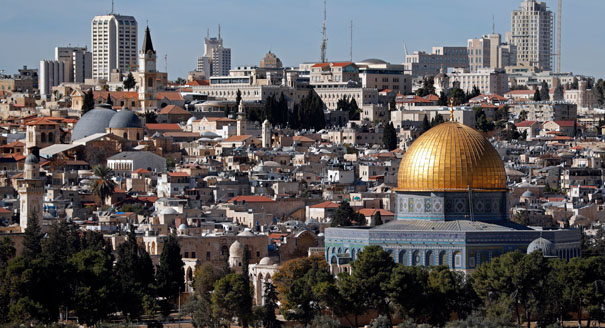Marwan Muasher | Vice president for studies at the Carnegie Endowment for International Peace, former Jordanian foreign minister and deputy prime minister
Many previous U.S. presidents made promises during their election campaigns to move the U.S. embassy in Israel to Jerusalem, only to reverse their positions after assuming office. The negative repercussions then, during a time when there was an active and promising peace process, were too daunting. Yet President Donald Trump has now decided to meet his campaign promise. This he has done for two reasons. The first is that he has surrounded himself with people who are ideologically committed to the Israeli state, with no empathy for the Palestinian side. The more important reason, though, is that this administration has shown an alarming lack of knowledge about the intricacies of the Arab-Israeli conflict, and seems insensitive to reconciling the move over Jerusalem with its claim to permanently solve the conflict through “the deal of the century.”
The move is sure to provoke strong reactions from the Arab and Muslim worlds. It will certainly end any meaningful dialogue with the Palestinians, and will render any deal the U.S. administration is trying to push, as unacceptable to the Palestinians as it already is, dead on arrival. What the U.S. does not seem to understand is that the new Palestinian generation is already focused elsewhere—namely on raising the cost of the occupation.
Bernard Rougier | Professor of Arab civilization and society at Sorbonne Paris III University, author of several books, including Everyday Jihad: The Rise of Militant Islam among Palestinians in Lebanon (Harvard University Press) and The Sunni Tragedy in the Middle East: Northern Lebanon from al-Qaeda to ISIS (Princeton University Press)
The Trump administration’s recognition of Jerusalem as the capital of Israel will have dramatic effects on the Middle East.
First, it will mean the definitive end of any kind of peace between Israelis and Palestinians, since no Palestinian leader will ever be able to resume negotiations knowing that East Jerusalem, with its symbolic and religious importance, will not be the capital of a Palestinian state. The situation is intertwined with the breakdown in peace negotiations between Palestinians and Israelis, with Palestinian political identity steadily undermined by regional religious dynamics—one Shi‘ite, the other Sunni—each exploiting the blockage of the peace process to its own advantage.
Trump’s decision will also nullify numerous Security Council resolutions which, by reaffirming the principles in Resolutions 242 and 338, never recognized Israeli annexation of the city in 1980. By transferring its embassy to Jerusalem, the United States will be seen as embracing the visions and policies of the Israeli right. This will mean giving up the last hope for a possible peace.
Second, it will offer a beautiful present to all radicals in the region, both in Iran and in Sunni militant circles. In Iran, Trump’s move will be met with a denunciation of the nuclear deal, and will give hardliners legitimacy to marginalize moderate trends in the country. Iran will return to its inflammatory slogans against the West and its allies in the region. Similarly, jihadis of all kinds will capitalize on the decision and mobilize against Arabs who have dared to side with the West, whether politically or culturally.
Arab allies of the United States will find themselves trapped, unable to justify their alliance with Washington under such conditions. Their leaders will have to resort to religion to survive, possibly weakening international cooperation against terrorism. Saudi Crown Prince Mohammed bin Salman’s intention of reducing the power of the religious establishment will be impossible to implement in such a context. He would have no choice but to reaffirm the religious credentials of the kingdom to preserve legitimacy, both in Saudi Arabia and outside. Facing civil wars and destruction, the Middle East will become the world’s worst nightmare.
David Makovsky | Ziegler distinguished fellow, director of the Project on the Middle East Peace Process at the Washington Institute, former senior adviser for peace negotiations in the Office of the Secretary of State (2013–2014)
President Donald Trump made his announcement about Jerusalem—thrilling Israelis and infuriating Arabs. In terms of what happens next, Trump’s biggest challenge will be to speak directly to Arab satellite television stations, or have his senior advisors do so, about the part of his statement that was lost on Arab viewers. Yes, the U.S. move acknowledges a de facto reality that Israel has had a capital in West Jerusalem since 1949. Even if the Palestinians get 100 percent of East Jerusalem, the capital will remain. Yet the second half of his remarks need to be heard as well: the U.S. doesn’t see the move as an endorsement of Israeli sovereignty over all Jerusalem. Trump said the sovereign issue of borders needed to be worked out by Israelis and Palestinians and that the United States would not put forward its own views.
It is not always easy to convey a nuanced message to any broad public but the issue of Jerusalem is so potentially explosive that U.S. government officials must make every effort to do so in the coming days and weeks. They can explain the duality of the message and why they wanted to acknowledge the reality of the past 70 years in at least part of the city. At the same time, they must use Arab media to publicly grapple with the Arab perception that Trump shut the door. If they don’t act, this perception will take root as reality, with all the consequences of this. As it is, Arab states don’t want to be identified with U.S. peacemaking efforts. For this to turn around, even if not immediately, there needs to be greater clarity about what Trump’s statement signifies and what it does not. The stakes are high.








